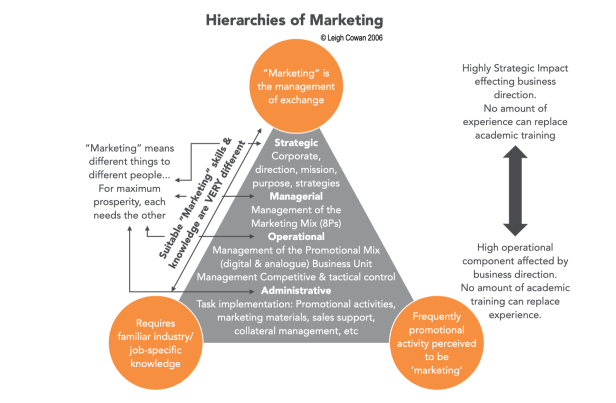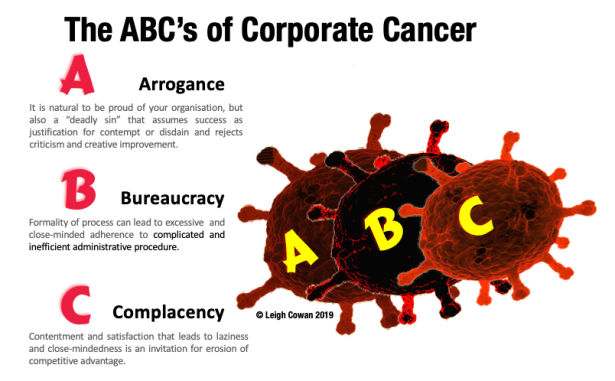The Conundrum of Marketing in the 21st Century is that most people in a Marketing role, actually do not understand the nuances of strategic marketing, the skills and tools of the craft, and do NOT possess the knowledge necessary to lead marketing activity.
Why? Because day-to-day marketing activities are primarily “operational”… requiring industry knowledge, company-specific experience, and specialist (dare I say ‘ product-oriented) insight.
Consider this diagram…

Those who commence as juniors, and rise through the ranks prove themselves in Administrative and Operational areas, and often a competent in playing ‘politics’ within their organisation. They develop great relationships, ‘earn’ promotion in rank and seniority, and “progress” to CMO or equivalent.
IF they were properly educated (substantial numbers do NOT have formal marketing credentials), they’ve most often forgotten their advanced training in marketing governance techniques, because it wasn’t needed at the junior level where they began their careers.
THINK about it: They complete their degree, maybe with a pass or a credit, which means they know 60% of their course material the day they sat their exam. Three months later? What have they retained? MUCH less! Three YEARS later? What have they retained? Very little!
The Conundrum is that they devalue or don’t even recognise educational/academic/strategic knowledge, and “likes employ likes”… so they mentor, hire, train, favour succession candidates that “fit” and the ignorance of advanced marketing skills is reinforced.
In truth, PROPER Marketing governance would stop failed product launches… It would stop companies going bad, losing money, going into liquidation… It would improve profits, grow businesses, develop best possible products, even improve political systems…
“Well, if ‘proper’ marketers know better why do they ‘market’ themselves then?” you say….
This is the Catch 22… The Marketing concept says, “Find out what the Market wants and deliver it”… BUT Heads of Business don’t want to hear that they are doing a bad job, that someone else could do their job better… CEO’s don’t want to accept they are infallible… that they made a mistake, or that they are simply lucky and have been at the right place and the right time in an operational situation that has ‘married’ with their operational skills and brought short term success…
The bigger the pay packet, the bigger the ego can be true… causing some (not all) leaders at the helm of their organisations to simply refuse to believe that anyone could possibly know better than them and their team.
This syndrome has been named “Corporate Cancer”… and experts acknowledge the three signs to be Arrogance, Bureaucracy and Complacency as qualities which are recognised as a danger or weakness for larger organisations. Even executives that are blind, and fall victim to, “Corporate Cancer” in their own businesses, can see it in others.

There are examples across the world… the US car industry, many banks, a large number of corporations, Nokia, huge retailers that struggle to reap forecast profit levels, political parties, and smaller businesses, all the way down to SME’s.
SUCCESSFUL CORPORATIONS HAVE A DEFENSE MECHANISM OR ARE RESCUED BY A DISRUPTIVE LEADER
There can be no doubt that the General Electric Corporation was saved by the extraordinary intuition of Jack Welch – a leader who almost fanatically believed in “the Marketing Concept” but also possessed a Strategic Marketing Governance approach.
This is the ‘missing element’ for many corporations led many convergent thinkers trained in operational management. For them, GE was in the light globe and electronics industry. For Jack Welch, GE was in the business of creating customer satisfaction in any industry where his company’s capabilities could be applied to satisfying market demand.
Other corporations like 3M, Mars, Unilever, P&G have legacy guidelines that help keep themselves in check.
THE LOST CRAFT AND THE DISTRIBUTION OF BUSINESS SKILLS
There are, of course, many brilliant brand strategists, corporate strategists and informed experts in the “business universe”. But, as in MANY professions, about 20% of the practitioners are “pearls”, while 60% are in a range of “pretty good to pretty awful” and the bottom 20% are destructive dead-weights who shouldn’t be in the profession at all.
In the Marketing profession, these are the people who thrive off lay-person misunderstanding of “marketing”. They endure by propagating the “smoke and mirrors”/”fluff and waffle” perception that Marketing is simply Marketing Communications, and sales support, based upon just work experience, opinion and attitude, rather than an applied and empirically proven science.
THE ANSWER & BEST OPTION
To embrace and optimize business efficiency and reach best possible business outcomes, a “balance” in all tiers of Marketing is necessary.
The existing Administrative and Operational Marketers are essential of administrative and operational marketing roles… but Managerial and Strategic Marketing is NOT their forte. AS attractive as senior corporate roles might be, and as much as operational and administrative marketers might believe they are entitled to assume these responsibilities, they are simply NOT equipped to do their job properly. This is the role of “big picture” , divergent thinkers, with whom they should collaboratively team up, to evoke winning business goals and strategy to achieve those goals.
The absence of strategic and managerial skills in Chief Marketing Officers is why CMO’s only last an average of 2 years. Lacking teh right knwoledge, training and skills, they take operational skills, instead of strategic skills, into visionary roles.
If you want to discover the tools CMO’s need, I urge you to grab a copy of my e-book, “Managerial Marketing in the Real World”, which marries new, cutting-edge, advanced corporate strategic models with practical, commercially proven methods. You can get it from… https://bookboon.com/en/managerial-marketing-in-the-real-world-ebook